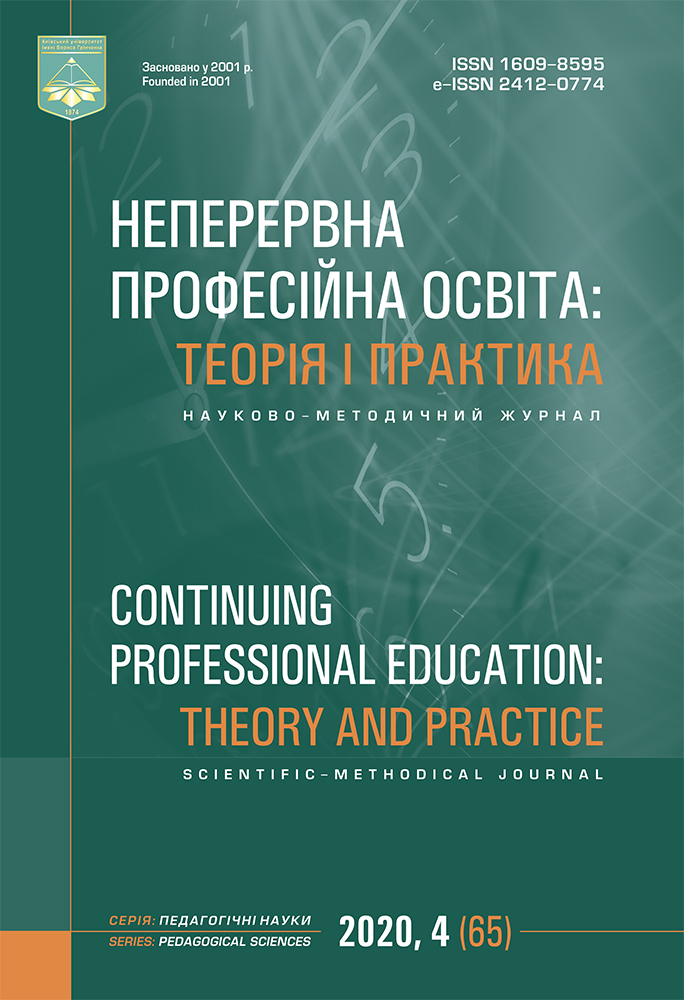PROFESSIONAL TRAINING OF SPECIALISTS FOR THE SELECTION OF PRIORITY SECTORS FOR IMPLEMENTATION OF CIRCULAR ECONOMY IN THE REPUBLIC OF POLAND
DOI:
https://doi.org/10.28925/1609-8595.2020.4.14Keywords:
circular business models, circular economics, knowledge of a specialist in circular economics, sector priority, specialist in circular economicsAbstract
The article considers analysis the content component of professional training for the selection of priority sectors for the introduction of the circular economy in the Republic of Poland. It is emphasized that the study of the experience of the Republic of Poland, which has taken an active position in the development of the circular economy and professional training for its implementation, is important for Ukraine given its proximity territorially, historically and cultural heritage. It is emphasized that in the process of accelerating the transition to a circular economy, education and training of specialists to implement the goals and objectives of the circular economy, which are fully consistent with the goals of global sustainable development, are quite important factors. It is proved that the training of specialists in circular economics for forecasting, for the ability to see in which sector of economic activity can get the most effective results not only in terms of economic effect, but also the preservation of the environment and public health is important. It is concluded that the professional training of specialists in circular economy should be aimed at the formation of knowledge about: factors taking into account the priority of the industry for the introduction of circular economy; application of business models of circular economies; methodologies of evolutionary nature of activity; evaluation methods by means of expert evaluation; opportunities to implement specific models of the circular economy in Polish realities; adaptation of business models to certain industries taking into account the context of the Polish market; adaptation of circular business models to priority industries from the point of view of the circular economy in Poland.References
Sysoiev, O. (2020). Fahivci XXI stolittya. Cirkulyarna ekonomika [Professionals of the XXI century. Circular economy]. Neperervna profesijna osvita: teoriya i praktika, 3 (64), 41–48. DOI: https://doi.org/10.28925/1609-8595.2020.3.5
Avdiushchenko, A., Zajaç, P. (2019). Circular economy indicators as a supporting tool for European regional development policies. Sustainability, 11 (11). https://doi.org/10.3390/su11113025
Bukowski, H., Sznyk, A. (2019). Мetodologia dopasowania cyrkularnych modeli biznesowych do priorytetowych sektorów wdrażania gospodarki o obiegu zamkniętym w Polsce. In J. Kulczycka (red.), Gospodarka o obiegu zamkniętym w polityce i badaniach naukowych (s. 47–72). Wydawnictwo IGSMiE PAN. https://circulareconomy.europa.eu/platform/sites/default/files/the_circular_economy_in_policy_and_scientific_research.pdf
Five from Finland: Circular economy (September 25, 2020). Good news from Finland. https://www.goodnewsfinland.com/feature/five-from-finland-circular-economy/
Mikielewicz, D., Dąbrowski, P., Bochniak, R., Gołąbek, A. (2020). Current status, barriers and development perspectives for circular bioeconomy in Polish south Baltic area. Sustainability, 12 (21), 1–15. https://doi.org/10.3390/su12219155
Polish Circular Hotspot. Cirkular Economy. http://circularhotspot.pl/pl/gospodarka-obiegu-zamknietego
Przywojska, J., Podgórniak-Krzykacz, A., Wiktorowicz, J. (2019). Perceptions of priority policy areas and interventions for urban sustainability in Polish municipalities: Can Polish cities become smart, inclusive and green? Sustainability, 11 (14). https://doi.org/10.3390/su11143962
Rataj, O. (2019). Opracowanie metodyki wyboru i propozycji wskaźników oceny postępu transformacji w kierunku gospodarki o obiegu zamkniętym oraz jej wpływu na rozwój społeczno-gospodarczy na poziomie makro w Polsce. J. Kulczycka (red.), Gospodarka o obiegu zamkniętym w polityce i badaniach naukowych (s. 73–98). Wydawnictwo IGSMiE PAN. https://circulareconomy.europa.eu/platform/sites/default/files/the_circular_economy_in_policy_and_scientific_research.pdf
Rok, B., Kulik, M. (2020). Circular start-up development: the case of positive impact entrepreneurship in Poland. Corporate Governance. https://doi.org/10.1108/CG-01-2020-0043
Rokicki, T., Perkowska, A., Klepacki, B., Szczepaniuk, H., Szczepaniuk, E. K., Bereziński, S., Ziółkowska, P. (2020). The importance of higher education in the EU countries in achieving the objectives of the circular economy in the energy sector. Energies, 13 (17). https://doi.org/10.3390/en13174407
Šebestová, J., Sroka, W. (2020). Sustainable development goals and SMEs decisions: Czech Republic vs. Poland. Journal of Eastern European and Central Asian Research, 7 (1), 39–50. https://doi.org/10.15549/jeecar.v7i1.418
Smol, M., Avdiushchenko, A., Kulczycka, J., Nowaczek, A. (2018). Public awareness of circular economy in southern Poland: Case of the Malopolska region. Journal of Cleaner Production, 197, 1035–1045. https://doi.org/10.1016/j.jclepro.2018.06.100" target="_blank">https://doi.org/10.1016/j.jclepro.2018.06.100
Uchwała nr 67 Rady Ministrów z dnia 16 lipca 2019 r. w sprawie przyjęcia «Polityki ekologicznej państwa 2030 – strategii rozwoju w obszarze środowiska i gospodarki wodnej». http://monitorpolski.gov.pl/MP/2019/794
Zielińska, A. (2019). Comparative analysis of circular economy implementation in Poland and other european union countries. Journal of International Studies, 12 (4), 337–347. https://doi.org/10.14254/2071-8330.2019/12-4/22
Wysokińska, Z. (2018). Implementing the Main Circular Economy Principles within the Concept of Sustainable Development in the Global and European economy, with Particular Emphasis on Central and Eastern Europe – The Case of Poland and the Region of Lodz. Comparative Economic Research, 21 (3), 75–93. https://doi.org/10.2478/cer-2018-0020
Downloads
Published
How to Cite
Issue
Section
License
Copyright (c) 2020 Oleksii Sysoiev

This work is licensed under a Creative Commons Attribution-NonCommercial 3.0 Unported License.



